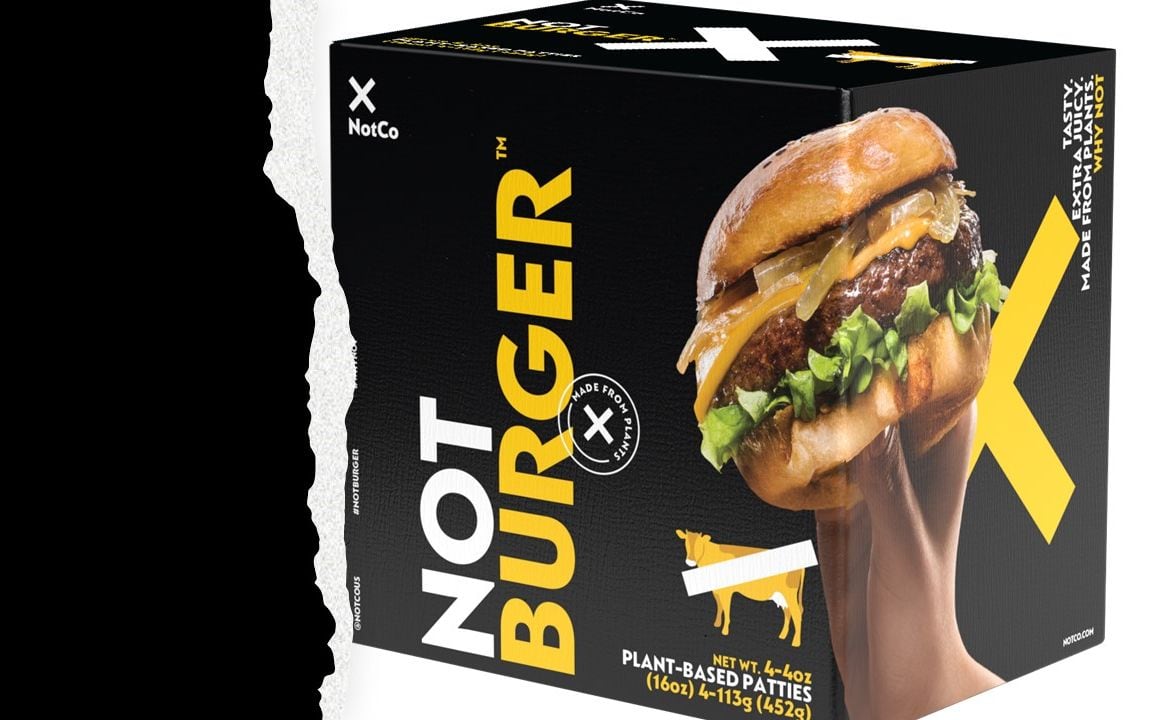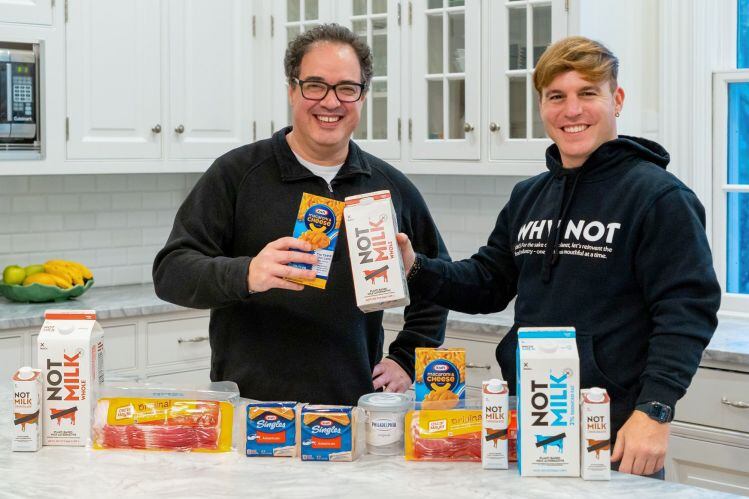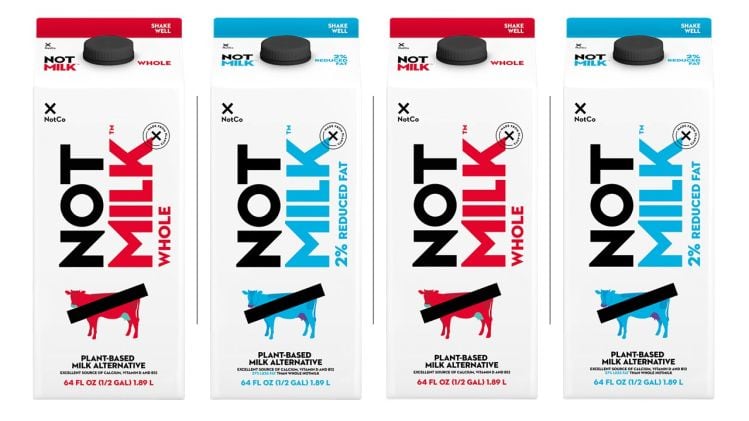While the US plant-based burger market is pretty crowded, with legacy brands jostling for space with meat giants, big CPG, startups, and foodtech players such as Beyond Meat and Impossible Foods, US buyers have seen the success of NotBurger in Chile, Argentina and Brazil, and they want a piece of the action, claimed NotCo CEO Matias Muchnick.
While every market is different, the fact that the NotBurger had been a hit in other meat-centric markets had opened a lot of doors in the US, said Muchnick, who has just announced a joint venture with Kraft Heinz to develop co-branded plant-based products.
Another plus point for buyers has been the fact that NotCo is not just a one-trick pony, but has a suite of plant-based products, he told FoodNavigator-USA.
“Many QSRs want to partner with NotCo because we were able to put in their stores not only a burger, but also a milkshake, an ice cream, and mayo, so the burger is really like the point of the spear to start bringing the whole portfolio of NotCo into a [given] market.”
He added: “We launched in Chile at the start of the pandemic in 2020, and in the first three weeks we sold 43 units per store per day, four times the sales target. At [conventional] retail, we already have 5% of the total burger market.
“That allowed us to go into Argentina, where we were able to put the product in [leading QSR chain] Mostaza, where 10% of the total burgers consumed in the chain are now NotBurgers. And then we scaled to Brazil, which is also a very meat-forward country, and we did really well, so we said, Why not the US?”
Taste, price, familiarity
At base, he said, plant-based companies needed to win on three points to appeal to consumers that don't currently buy meat alternatives: taste, price, and familiarity.
And NotCo is aiming squarely at the mass market with products that can outperform the competitive set on taste and price, while attempting to build familiarity through a suite of products, from NotMilk to NotBurger, that will introduce Americans to the 'Not...' brand, he said.
"This is also why we created the joint venture with Kraft Heinz. We have the ability to become a platform company for innovation for other brands but still get the recognition for our brands, so you can see a plant-based version of Philadelphia [for example] with NotCo’s logo.”
NotBurger to debut at Expo West in Anaheim next week
NotCo will be showcasing the NotBurger at the Expo West trade show in Anaheim, Calif., next week (#N1429) ahead of a rollout to retailers’ frozen aisles in the spring and summer with 4oz single packs at an SRP of $2.79 and 16oz four packs at an SRP of $9.99. (To put this into perspective, Beyond Burger two-packs typically retail at anything from $4.99 to $6.99 while Impossible Burger two-packs sell at around $5.99-$6.19.)
A foodservice-specific formulation will launch shortly thereafter, said Muchnick, who said existing products “are not doing a good enough job right now, as if they were, the category would be way bigger than it is now. So the question is, how do we move the needle and stand out?”
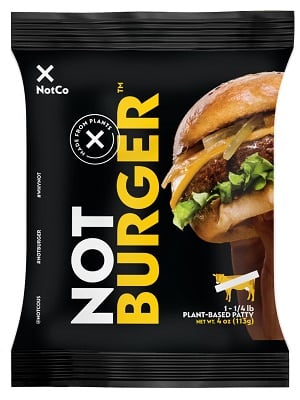
INGREDIENTS LIST: Water, texturized pea protein, coconut oil, sunflower oil, bamboo fiber, less than 2% of: methylcellulose, pea protein isolate, natural flavor, rice protein isolate, salt, cocoa powder, nutritional yeast, psyllium fiber, potato fiber, red beet juice concentrate, chia protein concentrate, dried spinach powder.
NUTRITION FACTS (113g burger): 270 calories, 15g protein, 21g fat, 13g sat fat, 440mg sodium, 4g fiber, 20% DV for iron
Formulation and nutrition
So, what’s so special about the NotBurger?
All formulations are market specific, with the US NotBurger “having more of a ground beefy taste versus say smoky,” said Muchnick, who uses a base of textured pea protein, coconut oil, sunflower oil, and bamboo fiber, coupled with some slightly more unconventional ingredients identified by NotCo’s artificial intelligence platform ‘Giuseppe’ such as cocoa powder.
At 13g, the NotBurger contains more saturated fat than the Impossible Burger (8g) and the Beyond Burger (5g), and slightly more sodium (440mg vs 370mg for Impossible and 390mg for Beyond), and has a succulent, juicy bite that sets it apart, he claimed
“We have a product that is better than any plant based product in the market because we’re trying to appeal to the mass market. If that comes with a slightly elevated amount of saturated fat versus our competition, that's OK. When I go grab a burger, my number one priority is that it has to taste amazing.”
‘How do you explain the difference between one burger and another that basically have the same ingredients?’
As for what distinguishes the NotBurger from the scores of other plant-based burgers using pea protein and coconut oil as a base, Muchnick echoed comments made by many formulators in the space that it’s less about novel ingredients or combinations, than the process.
“We do use some ingredients like cocoa powder that the rest don’t, but a lot is in the process, which is how you explain the differences between one burger and another that basically have the same ingredients.”
Pea protein, for example, can have off notes regardless of the supplier, he said. “When you try some other plant-based burgers you notice a kind of aftertaste from the pea protein that we don’t have; using AI we’ve been able to understand the process we need to get the flavor profile we want.”
As for fat, he said, while most plant-based burgers use a similar combination of a hard fat such as coconut oil and a liquid oil such as sunflower, coupled with methylcellulose, which gels during the cooking process to enhance the bite and firmness and juiciness of the finished product, NotCo had developed techniques to enable the fats to perform more effectively in the formulation.
“So NotCo’s way of developing the NotBurger was first to create 'NotMatrix,' the matrix of the burger, and then 'NotBlood,' the juiciness and the ‘blood’ of the burger, and then in an emulsifying process we kind of micro-encapsulate the fats into the fiber, so you help to stop the fat leaking out when you cook the burger in the pan.”
Designer fats
NotCo is also experimenting with fats and other ingredients produced via precision fermentation, he said, “although this has constraints, such as scalability and price points… so there are companies out there saying I can make this [ingredient] in a 1,000-liter bioreactor, when [for this technology to be commercially viable] you need a bioreactor of, say, 200,000 liters, and that’s a lot more difficult, but it's a very interesting pathway.”
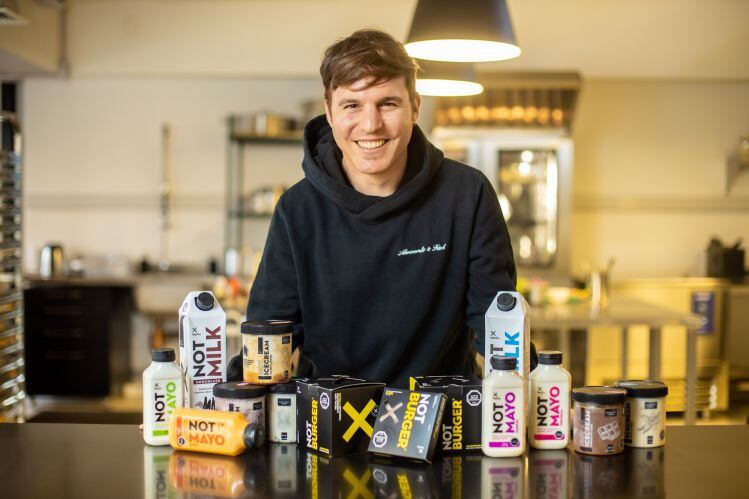
NotCo – which has raised $350m to date - has been granted a first-of-its kind US patent for its AI technology (‘Giuseppe’), which it claims gives it an edge in the race to reverse engineer animal foods and put them back together - molecule by molecule - with plants, creating next-generation meat, egg, and dairy alternatives.
“Our approach has always been, there's no way we're going to mimic something if we first don't understand it, right?” said CEO Matias Muchnick, who entered the US market in 2020 with NotMilk, which is now available in 6,000 stores in the US including Whole Foods, Public, Sprouts and Wegmans.
“We have collected a lot of data that is allowing us to understand food at a different level, create products faster, better, more accurate, and less costly than anyone else in the space.” Image credit: NotCo

